| Weight | 1 lbs |
|---|---|
| Dimensions | 9 × 5 × 2 in |
| host | mouse |
| isotype | IgG2a |
| clonality | monoclonal |
| concentration | lyophilized |
| applications | ELISA, WB |
| reactivity | A35R, monkeypox |
| available sizes | 1 mg |
mouse anti-Monkeypox virus A35R monoclonal antibody (101) 5800
$450.00
Antibody summary
- Mouse monoclonal to Monkeypox A35R
- Suitable for: WB,ELISA
- Reacts with: A35R
- Isotype: IgG2a
- 1 mg
mouse anti-Monkeypox virus A35R monoclonal antibody (101) 5800
| target relevance |
|---|
| Reactive to the EV membrane protein by ORF A35R of Monkey Pox Virus.This antibody is expressed in HEK293 cells and and was purified using a combination of Protein A/G chromatography. It is reactive against VACV antigen and lysate, CPXV lysate, MPXV lysate, and VARV antigen and lysate. This product is sold for research use only. Optimal working concentrations should be determined by each researcher. |
| Protein names Monkeypox Virus (mpox) |
| Structure The monkeypox virus is a large, double-stranded DNA virus within the Orthopoxvirus genus, known for its complex structure and multiple subunits that contribute to its infectivity and immune evasion. The virus is brick-shaped, with dimensions of approximately 200-250 nanometers, and is enveloped by a lipid bilayer that contains various glycoproteins essential for host cell entry. Within this outer envelope lies the core, or nucleoid, which houses the viral genome. This core is flanked by two lateral bodies that carry enzymes and proteins vital for early viral replication and manipulation of the host's cellular environment. The viral genome itself is extensive, encoding over 190 proteins that are crucial for the virus's life cycle, from entry and replication to immune evasion and virulence. Key structural proteins encoded by the monkeypox virus genome include B6R, A35R, and M1R, among others. The B6R protein is an envelope glycoprotein involved in the formation of the extracellular enveloped virus (EEV), a form that enhances viral spread within the host by evading the immune system. The A35R protein plays a role in modulating the host immune response, particularly by interfering with the host's ability to mount an effective defense, thereby allowing the virus to establish a more persistent infection. The M1R protein, also known as the core protein, is crucial for maintaining the structural integrity of the viral core, ensuring that the viral DNA is protected and efficiently replicated within the host cell. Together, these and other viral proteins orchestrate a complex interplay of mechanisms that enable the monkeypox virus to infect host cells, replicate, and spread, making it a highly efficient pathogen. |
| Biotechnology Diagnosis of monkeypox involves a combination of clinical assessment, laboratory testing, and advanced molecular techniques. Clinically, healthcare providers assess symptoms such as fever, swollen lymph nodes, and a distinctive rash that progresses through stages like macules, papules, vesicles, and pustules. Due to the similarity of these symptoms to other conditions like chickenpox, laboratory confirmation is crucial. Polymerase chain reaction (PCR) testing is the most reliable method, detecting viral DNA in samples from skin lesions, blood, or other bodily fluids. Additionally, serological methods, including antibody enzyme-linked immunosorbent assay (ELISA), are used to detect specific antibodies against the monkeypox virus. These tests help determine if an individual has been previously exposed to the virus or is in the later stages of infection. ELISA and other serological assays are valuable for both acute and retrospective diagnosis, providing insights into the immune response and potential immunity. In some cases, electron microscopy or virus isolation in cell culture may be utilized, particularly in research settings, to confirm the presence of the virus and study its characteristics. |
Data
| No results found |
Publications
| pmid | title | authors | citation |
|---|---|---|---|
| We haven't added any publications to our database yet. | |||
Protocols
| relevant to this product |
|---|
| Western blot ELISA |
Only logged in customers who have purchased this product may leave a review.

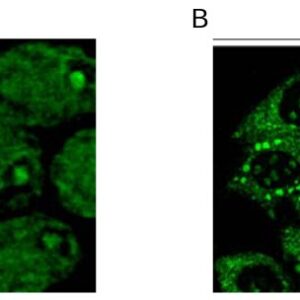
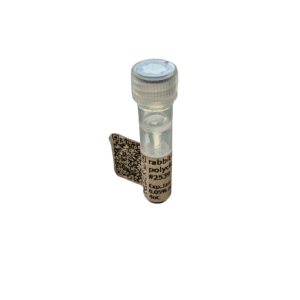
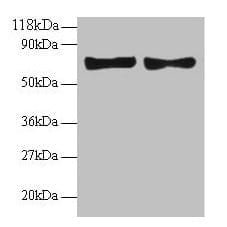
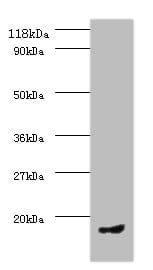

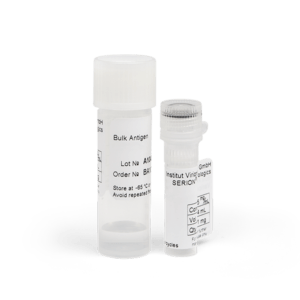
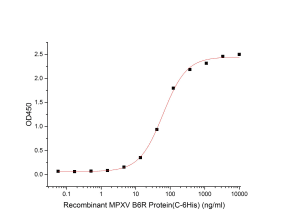
Reviews
There are no reviews yet.